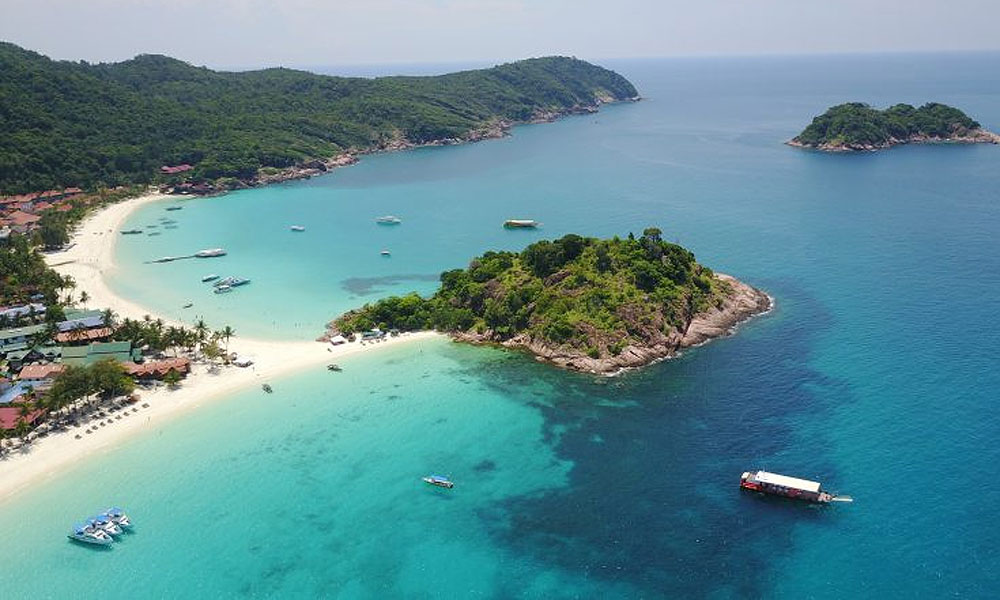For marine conservationists, the Covid-19 pandemic has brought a silver lining in the reduction of potentially destructive human activity in sensitive biodiverse marine parks.
This is seen in popular tourist spots like Turtle Bay in Redang Island and Teluk Pauh in Perhentian island, which before this received more than 500 snorkelers a day - some of whom violate codes of conduct by touching the turtles, fish, corals, and other marine life.
The crowded snorkelling fests also endanger turtles in different ways, experts say.
Every year, a handful of turtles wash up on the beaches of Malaysia, their shells displaying damage consistent with cuts from motor propeller blades from boats, observed Andy Lua, a dive instructor at Perhentian Besar Island.
Last year, a turtle was spotted with a severely damaged shell in the vicinity of Teluk Pauh, Perhentian Besar Island, he said.
However, when contacted, local authorities said they were unable to patrol and prevent these violations to marine life due to lack of human resources, among other reasons.
Following the brief lifting of tourism activities last year, tourists again flocked to the islands, posing a risk to marine life.
Marine scientist and founder of Ocean Quest Global, Anuar Abdullah, said this happens even though tourists were repeatedly told not to touch marine life as it stresses the animals, resulting in disorientation and sometimes, death.
This is because many marine species have an anti-bacterial layer, a form of mucus over their body to protect themselves from parasites, and touching them removes that layer, leaving them vulnerable to infections, he said.
Some creatures also have delicate and fragile structures which could be damaged from touching, he said.
Sea cucumbers, for instance, expel their intestines when disturbed, and this could be dangerous to them if done repeatedly, he said.
It could also endanger tourists, he said, as some creatures won't hesitate to use their venom, a defence mechanism, when touched. The venom could be fatal.

Guides drag turtles to the surface
Tourists are not the only ones to blame for having poor behaviour.
A Department of Marine Parks Malaysia (DMPM) spokesperson said some guides drag turtles to the surface so snorkelers can view and pet them.
It has tried to combat this by educating the guides but said it is difficult to monitor them on the job, especially when it involves boats ferrying day-trippers.
The Department of Fisheries said it had “asked the government to consider a more sustainable and environmentally friendly tourism model, moving away from mass tourism” in Marine Parks.
It said the pandemic has provided an opportunity to rebuild the Marine Protected Areas, and to ensure policies moving forward are in line with good practices seen at low-density and high-value destinations.
Locals turn to illegal fishing to keep afloat
Marine life in the Marine Parks are also endangered by fishing, even though it is prohibited under the Marine Parks regulations.
This is worse during the quieter lockdown period, Lua said.
Lua and his fellow dive operators on Perhentian Island said they have lodged numerous complaints, but the DMPM spokesperson said the agency does not have enough enforcement officers.
“We have limited resources and sometimes by the time we reach the location, they (the illegal fishermen) are gone,” he said.
Even so, authorities managed to seize 15 steel cages and fish traps in the waters of Lang Tengah and Perhentian Island in a recent raid.
Most of the fish trapped were coral fish, the DMPM spokesperson said, but because the culprits were first time offenders, the fine meted was only RM500 - leaving enforcement officers demotivated.
“We go through a lot to seize these cages. Our divers sometimes have to endure rough seas and tough conditions and all for a small fine of RM500.
“Sometimes the perpetrators are absent, we can only release the fish and seize the equipment,” he explained.
Many of the perpetrators are the islands’ villagers, who are motivated by financial gain, especially as the tourism revenue had depleted due to the prolonged pandemic.
Anuar of Ocean Quest Global suggested other methods to support the livelihoods of local villagers, including providing government grants for them to become “guardians” of the marine ecology and to equip them with the skills for sustainable farming of high-value herbs and vegetables.
But until creative solutions like these can be implemented, marine life may continue to be at risk, he said . - Mkini




No comments:
Post a Comment
Note: Only a member of this blog may post a comment.